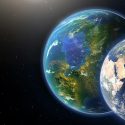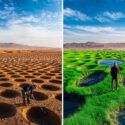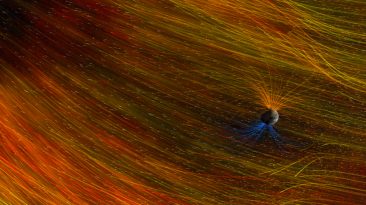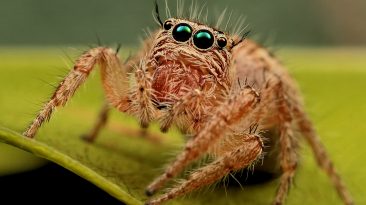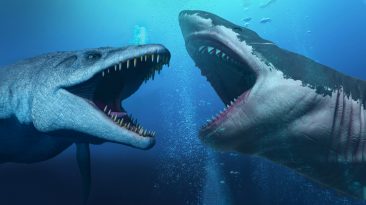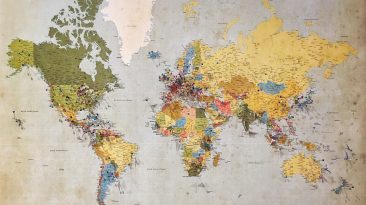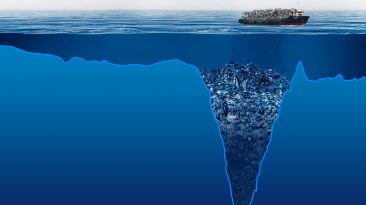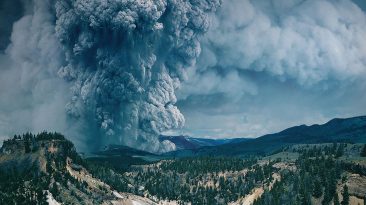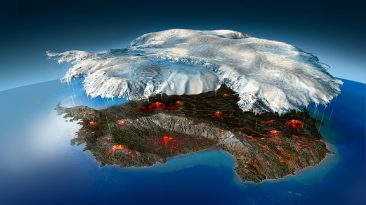Right now, only 15% of life on Earth lives in Oceans. Today, we’re gonna crank that up a notch. You, as well as all life on Earth, are moving underwater.
Would we have to evolve to pull this off? Which species would thrive? And which species would draw the short straw?
Pack your bags, because today, we’re moving every living species on Earth underwater. But before we do, let’s see what we’re working with.
It’s estimated that 80% of Earth’s species live on land, 15% in the ocean, and the remaining 5% in freshwater. This is going to be a big move. And in order to pull this off, we’re going to have to adapt. And fast.
For the sake of this video, humans, and animals are all going to make the evolutionary jump and adapt to breathing underwater. Your uh, new gills really bring out your eyes.
Gills, like the ones currently growing from your neck, are a respiration system that uses a network of blood vessels. They draw in oxygen from flowing water, and diffuse it through gill membranes.
This would allow you to take in the splendors of your new underwater home. And, you know, not drown.
So, now that your mutated family and pets have made the descent, what’s life going to be like down here, anyway? Well, you may have to get over your fear of the dark. Both humans and animals would need to develop ways to battle darkness. I’m talking about developing a better sense of touch, and the ability to sense vibrations.
Other ocean newbies may evolve to create their own light, like the lanternfish, in order to attract mates or prey. Imagine your cat chasing its own light. Awww. It’s also going to feel a lot colder.
The cold environment is going to push you into adapting your membranes to keep them liquid. If you don’t, your fat will solidify. But we know you can handle this, so you’ll have unsaturated fats in your membranes, so that they remain liquid.
And hey, does anyone else have a headache? This is an educated guess, but I’m thinking the eight tons of added pressure per square inch may be the culprit.
On the plus side, you’re also going to have a lot more room. The Pacific Ocean alone covers 165.25 million square km (63.8 million square mi). That’s larger than all the land on Earth, which measures in at 148.94 million square km (57.5 square mi). Talk about an upgrade in real estate.
So, provided that you and your animal friends get the evolutionary upgrades, you should be okay. But plants and bugs got the shaft on this one.
Plants would need to rely solely on wind for pollination. This would make it extremely difficult for plant life to be successful underwater. Bugs like ants and worms would bite the dust, and that’s a problem for our soil. This is because worms help nourish the soil, and ants help to aerate it. This is actually super important.
Earthworms make nutrients more available to plants, since they feed on plant debris. When they die, the nutrients are available for the plants to absorb. Without this process, the whole ecosystem will fall out of whack.
And that brings us to a bigger point. Everything on Earth is connected in some way, with everyone playing an important role in the ecosystem of the planet. If we change the very fabric of how our world is structured, it would change almost everything about it, from the plant life to the gas contents of the atmosphere.
If we packed up shop and moved all life to the oceans we would have much more space. The downside is, life is going to be a lot less diverse thanks to the constraints of water and lack of sunlight. So before we make any major moving plans, what if we give it a test run and build a home away from home?
Sources
- “Why Are There So Many More Species On Land When The Sea Is Bigger? “. Zhang, Sarah. 2017. The Atlantic.
- “Why Did Life Move To Land? For The View | Quanta Magazine”. Jennifer Ouellette. 2021. Quanta Magazine.
- “Biodiversity in water and on land”. sciencedirect.com.
- “The Pacific Ocean Is Larger Than All Land On Earth”. Brilliant Maps.
- “Just How Big Is The Ocean? | Smithsonian Ocean”. 2021. ocean.si.edu.
- “Species count put at 8.7 million”. 2011. BBC News.
- “How Many Animal Species Are There?”. Bob, Strauss. 2021. Thoughtco.
- “How Do Animals Breathe Underwater?”. Mindy Weisberger. 2021. livescience.com.



